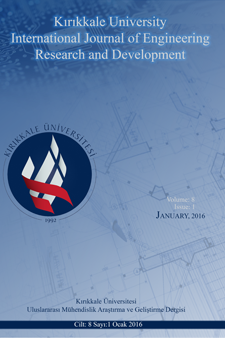Dubleks Paslanmaz Çeliklerde Sigma Fazının Korozyon Dayanımına Etkileri
Dubleks
paslanmaz çelikler; delta-ferrit
ve östenit fazlarının yaklaşık olarak
yarı-yarıya bir arada bulunduğu
ve ferritik ile östenitik türlere göre yeterli korozyon dayanımı ve mukavemet
özelliklerinin bir arada istendiği uygulamalarda tercih edilmektedir.Bu çalışmada; dubleks paslanmaz çeliklerde ısıl işlem ve
kaynakuygulaması veya kullanım ömrü süresince değişen termal koşullara göre
mikro yapıda oluşabilecek zararlı fazlardan olan sigma fazının tespit edilmesi
ve korozyon davranışlarına etkilerinin incelenmesi amaçlanmıştır. Sigma fazı
iki ayrı ana
malzemede ısıl işlem
ile oluşturulmuş, mikro yapısal
ve korozyon davranış durumları
incelenmiştir. Bu amaçla; sigma fazının en hızlı oluştuğu 800°C sıcaklığı
ısıl işlem amacıyla
seçilmiş ve iki ayrı
numuneye 5,5 saat
ve 16 saat
sürelerle ısıl işlem uygulanmıştır. Bu
sıcaklıkta bekleme süresinin
sigma fazının miktarına
ve korozyon dayanımına etkileri
de araştırılmıştır.
Anahtar Kelimeler:
Dubleks Paslanmaz Çelik, SigmaFazı, Paslanmaz Çeliklerde Korozyon
Dubleks Paslanmaz Çeliklerde Sigma Fazının Korozyon Dayanımına Etkileri
Duplex stainless steels
consistsof approximately half austenitic and half δ-ferritic phases and are
preferred due to applications demanding both satisfactory corrosion and
strength properties versus solely ferritic and austenitic grades. In this work;
deleterious sigma phase that may form in microstructures of S32205 (2205)
duplex stainless steel plates was intended to be quantified after various
thermal conditions such as heat treatments, welding and service life and also
the effects of sigma phase on microstructural and corrosion properties were
investigated. Sigma phase was formed in two distinct raw material by applying
heat treatments, and microstructural and corrosion states were analyzed. For
this purpose; 800°C was adjusted as heat treatment temperature and two seperate
specimens were heated through 5,5 and 16 hours of duration time in
consequenceof the most rapidly formation rate of sigma phase at this
temperature.
___
- [1] J. Lippold and D. Kotecki: Welding Metallurgy and Weldability of Stainless Steels, Wiley Interscience Publications, New Jersey (2005)
- [2] Gunn N. Robert: Duplex Stainless Steels, Microstructures, Properties and Applications, Abington Publishing, Cambridge, England (2003)
- [3] ASM Handbook Vol.9, Metallography and microstructures of Stainless Steels and Maraging Steels,p.670-1656, USA, (2004)
- [4] F.Tehovnik ve arkadaşları, Microstructure evolution in SAF 2507Superduplex Stainless Steel, Slovenia, (2011)
- [5] ASTM A 923-08 ‘Standart Test Methods for Detecting Detrimental Intermetallic Phase in Duplex Stainless Steels, USA, (2008)
- [6] ASTM E-562-11, Standard Test Method for Determining Volume Fraction by Systematic Manual Point Count, (2011)
- [7] ASTM E 1245-03, Standard Practice for determining the Inclusion or Second Phase Constituent Content of Metals by Automatic Image Analysis (Re-approved 2008)
- [8] Pierre R. Roberge, Handbook of Corrosion Engineering, Chapter 8, 734, Materials’ Selection, McGrawHill Publications, (2000)
- [9] Welding Brazing and Soldering, ASM Metals Handbook Vol.6. ASM International, USA, (1993) [10] J.D.Fritz, Effects of metallurgical variables on the corrosion of stainless steels, Corrosion: Fundamentals, Testing and Protection, Vol. 13-A, ASM Handbook, ASM Int.,(2003)
- [11] Shortsleeve F.J, and Nicholson M.E, Transformations in ferriticchromium steels between 595-815°C, ASM,(1951) [12] Kotecki, D.J, Heat treatment of duplex stainless steels, 68 (11), 431-441, Welding Journal, (1989)
- Başlangıç: 2009
- Yayıncı: -
Sayıdaki Diğer Makaleler
Savunma Sanayinde Kullanılan İleri Kompozit Malzemeler ve Uygulama Alanları
Erdem ERYILDIZ, Ayşegül AKDOĞAN EKER
Dubleks Paslanmaz Çeliklerde Sigma Fazının Korozyon Dayanımına Etkileri
Aziz Barış BAŞYİĞİT, Adem KURT
Savunma Sanayinde Kullanılan Magnezyum Alaşımları ve Uygulama Alanları
Meltem DEMİRCİ, Ali Serdar VANLI, Anıl AKDOĞAN
Ballistic Performance of Kevlar49/ UHMW-PEHB26 Hybrid Layered-Composite
Mert Onur YAVAŞ, Ahmet AVCI, Mehmet ŞIMŞIR, Ahmet AKDEMIR
S32205 Dubleks Paslanmaz Çeliğin TIG Kaynağında Soğuma Hızının Mikroyapısal Özelliklere Etkileri
